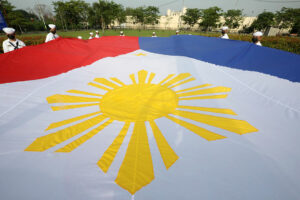In defense of the Philippines

Executive Order No. 37 (S. 2023) gave effectivity to the National Security Policy (NSP) 2023-2028. It’s an interesting document, providing a picture of our strategic posture not only from the text but from the table of contents itself.
For sure, the document is anchored on “the enduring values that have enabled Filipinos through the centuries to cope and thrive,” and correctly contextualized the national security goals “based on an assessment of the emerging strategic landscape and placed within the context of the country’s socio-political values, fundamental laws, and core national interests.”
Nevertheless, unlike the 2017-2022 NSP (which logged “Territorial Integrity” merely fourth amongst National Security Interests), the present NSP puts “National Sovereignty and Territorial Integrity” at the top of the list. As it should be.
Amidst reports that 21 Chinese ships were spotted heading toward Pag-asa Island, while almost the same number gathered around Ayungin Shoal, a recent national survey (OCTA, published August 2023) showed that an overwhelming majority (70%) of Filipinos are demanding that the government defend our territory. This majority cuts across all social classes. Even more tellingly, 65% of Filipinos declared their willingness to fight militarily to defend our territories, with 61% wanting to modernize and strengthen our armed forces. This within the context of another national survey (SWS, 2019) that declared 70% of Filipinos are “worried” about the increasing number of Chinese workers in the country.
Hence, the National Security Policy was right to declare that: “The Philippines shall stand by its cherished values as a sovereign nation that subscribes to multilateralism and rules-based international order. The Philippines shall remain steadfast in its commitment to UNCLOS and in upholding the final and binding South China Sea Arbitration Award of 12 July 2016. The Philippines shall sustain efforts in safeguarding the Philippine maritime zones, especially in the West Philippine Sea and Philippine Rise, and shall strengthen the National Task Force for the West Philippine Sea (NTF-WPS) to come up with better measures to cope with the changing security environment in the maritime region.”
Equally correct is: “The Philippines shall strengthen the Mutual Defense Treaty between the Republic of the Philippines and the United States of America that was signed on 30 August 1951, along with other existing cooperation mechanisms with regional partners, to achieve a credible defense capability.”
It is good that our NSP makes mention of our democratic values and adherence to the rule of law and human rights. While it is oft-repeated that foreign policy is merely contingent on passing national interests, nevertheless, it is very much to the country’s interest that the Philippines unabashedly and honorably stand for our societal and constitutional values, principles, and interests.
This entails that our foreign alliances be based not merely on economic or other short-term materialist considerations but also whether such country partners are aligned with our own democratic values, including that of the rule of law and human rights. It is upon this sharing of values that our alliances should be founded upon to ensure protection of our maritime commerce, for which security arrangements, as well as greater engagement in international trade, is critical.
Additionally, the following policy and legislative considerations could also positively contribute to Philippine defense:
• The revival of the ROTC (Reserve Officers Training Corps) for college-level youth and supplemented by a mandatory military service requirement (one or two years) for the 20-35 age group, plus another program for those older and up to 50 years of age. As of 2023, there are around 29,334,342 Filipinos in the 20-35 age range. Even if only 10% of them can be utilized militarily, that would still constitute a quite serviceable fighting force.
• Refashion a defense posture taking advantage of our separate and disparate islands and utilizing the fact that those islands are divided internally by rivers, lakes, hills, caves, and other land features. The point is to organize our defense forces to work with a national command, if available, but be capable of quickly and readily adapting to independent guerilla efforts on a per region or district basis.
• To facilitate this, our Self-Reliant Defense Posture (SRDP) program should be calibrated around this policy, with armament and transportation manufacturing and purchases reflecting the type of defense planning advocated here: producible en masse, mobile, easily hidden, and interchangeable.
• For such SRDP, the Departments of National Defense (DND), and Trade and Industry can work on developing local industries for that purpose. One huge consideration is the sourcing and storing of fuel and minerals used as raw materials for whatever equipment is necessary for a credible defense effort.
• The DND could work with the Department of Information and Communications Technology to develop a group that will focus on defensive and offensive computer expertise and technology.
• The Philippine Competition Commission could increase emphasis on monitoring and regulating foreign ownership in industries vital to national security.
• The National Food Authority should emphasize stockpiling of food and other related resources, viewed to include readiness in food supplies in case there is indeed a need to shift to a highly prolonged defense effort (or even natural calamities).
I say quite emphatically: Urgent efforts must be made to address our depreciating age demographics. Last year, 57% or 870,820 of newborn Filipinos were born illegitimate. The Philippine Statistics Authority also reported that the Total Fertility Rate of Filipino women aged 15 to 49 years declined from 2.7 children per woman in 2017 to 1.9 children per woman in 2022, effectively placing the Philippines below the replacement fertility level of 2.1. The security, economic, and social problems that an aging population can bring, if unaddressed, could be catastrophic.
Finally, President Ferdinand Marcos, Jr.’s call on Aug. 14 (building on his April 27 speech before the Kapisanan ng mga Brodkaster ng Pilipinas) against “fake news” is a huge step forward in strengthening our defense capabilities. Speaking out against “active disinformation and misinformation” (and this could be said particularly so regarding propaganda done by or at the behest of a foreign government), Mr. Marcos asked that “truth and credibility, the rule of law [be upheld], especially in the practice of broadcasting, news reporting and information-dissemination.”
For his part, Presidential Communications Office Secretary Cheloy Garafil, outlined the collaboration our government is making to combat such “fake news,” calling on “partners: META, Google, TikTok, and X [formerly Twitter],” alongside the Departments of Education, Interior and Local Government, and Social Welfare and Development, as well as the Commission on Higher Education.
It is time indeed for our government to emphasize and for the public to be very aware of our national security challenges and strategy. More than at any other time since a half century ago, when a communist takeover had been an utter possibility, or 30 years before that, when the country had been overrun by an invading foreign force, our very existence as a democratic republic, as a nation, is at stake.
Jemy Gatdula is a senior fellow of the Philippine Council for Foreign Relations and a Philippine Judicial Academy law lecturer for constitutional philosophy and jurisprudence
https://www.facebook.com/jigatdula/
Twitter @jemygatdula




